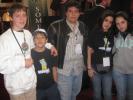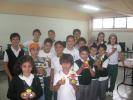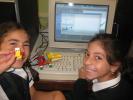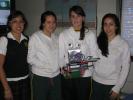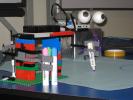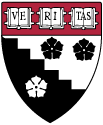Little Teachers (Part 1 of 2): An Interview with Lourdes Garcia Vazquez about Robotics Club
Robotics class is a popular elective course at Colegio Las Hayas, a private school in Veracruz, Mexico. Lourdes Garcia Vazquez, or "Lula," teaches robotics twice a week. Mondays, Lula works with "veterans" who have at least three years of Scratch experience, ranging from age nine to high school senior. Wednesdays are the "little ones," some as young as five years old. In 2001, Lula started a robotics summer camp and never has any trouble finding students from robotics class to teach at the camp. Having students teaching at summer camp is a win-win situation for both Lula and the students. "Little people communicate better with other little people. Somehow they know how to do it." In return, the student-teachers receive a small salary.
Lula calls them her "little teachers."
Lula initiates technology projects throughout other classes at Las Hayas as well. Since 1998, she has been the general coordinator of the technology program for all grades, K-12, and has built up a lot of creative freedom for her work. "The administration trusts my intuition. When they trust and you don't give up on them, that is a good combination." Patience, enthusiasm, and a few marketing skills are how Lula gains teachers' trust. "You have to sell the projects: give them ideas, say how great they are, show what we have been doing, and be enthusiastic, so they trust that things will not be hard." Her sales pitches often bear returns to Lula in the form of free advertising. "I go little by little. When one teacher tells another teacher that everything was alright and that she's very happy with the students' results, then the other teacher comes and asks, 'Can we do the same?' Of course, some teachers you will have to hunt down. There's a whole variety."
Nevertheless, Lula's passion for educational technology rubs off mostly on students. In her computer science course, high school seniors develop Scratch projects based on current science topics. Students take inspiration from science magazines and then design challenging projects on topics like quantum physics, solar cells or hydrogen fuel. A group of girls this year titled their project: "Breast Cancer and Nanotechnology." They designed a buckyball sensor using Scratch and a Lego WeDo Robotics kit that players must navigate through the breast to exterminate cancer cells while leaving healthy cells intact. The senior students are now engaged in a new final project directed via webcast by John Galinato from Build-It-Yourself in Cambridge, Massachusetts. For their final exam, the students developed six robots that respond to voice recognition, utilizing the WeDo kits and their Scratch programming skills.
Out of all these amazing students how did Lula choose just five little teachers? "I always say that they chose themselves. They are the type of students that say 'Hey Lula, can I stay more time?' or 'Hey Lula, what's this?' They ask lots of questions, they want to find out everything, and they continue working and asking. When I decided to train them to be teachers, I asked them if they wanted to be teachers to other youngsters and adults and they went crazy happy. They said 'Yes! Yes!' and that's how we started with these little people, these little teachers."
The youngest, Bernardo, is a tiny 10 year-old who started in both the robotics summer camp and Lula's robotics class in kindergarten at age six. The oldest, Federico, is 18 and will graduate this year. Mariana, a tenth grader, accompanied Lula and Federico to the 2006 European Robotics Championship in the Netherlands. Jeronimo, age 13, and Regina, age 12, complete the team. At the 2009 SOMECE (Mexican Society for Computers in Education) Conference at Casa Telmex in Mexico City, the little teachers produced two Scratch workshops to great acclaim. "The leader of the program came to the kids and asked 'Can you give another one? Because everyone is demanding the workshop.' So the kids gave a third workshop to new people that wanted to learn WeDos and Scratch. That was a complete success." The little teachers were invited to teach at the conference again in the future.
Many of Lula's other students are now looking for opportunities to teach. Lula plans to create two teams of little teachers for her robotics camp next summer. She chuckles when I ask about challenges she faces in her position. She responds, "Even though the owners of the school are really enthusiastic and everything, they always question my work. They say, 'Are you sure you can do that?' I cannot tell you everything is successful. I have to be realistic. But I always try and sell and the majority of projects come out well."

